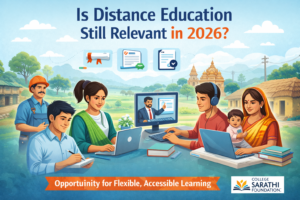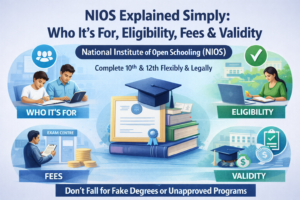Importance of Skill-Based Learning for Youth Employment in India
Introduction
India is home to the world’s largest youth population, with nearly 65% of citizens under the age of 35. This demographic dividend presents an enormous opportunity for the country’s economic growth, innovation, and development. However, despite having such a massive pool of energetic and educated youth, unemployment remains a serious challenge.
One of the primary reasons for this paradox is the gap between academic education and industry-required skills. Traditional schooling and college degrees in India often focus more on theory and rote learning, while employers increasingly demand practical knowledge, problem-solving ability, and hands-on expertise.
This is where skill-based learning comes into play. By shifting the focus from memorization to application, India can empower its youth with the competencies they need to thrive in the job market. Students today also have the advantage of exploring UGC-approved online degree courses that combine academic learning with industry-ready skills.
In this blog, we’ll explore why skill-based learning is vital, its benefits, challenges, government and private initiatives, and how it can reshape the future of youth employment in India.
Why Skill-Based Learning Matters in India
Bridging the Education-Employment Gap
Every year, India produces millions of graduates across disciplines. Yet, industry leaders often point out that a large percentage of graduates are unemployable because they lack practical exposure. According to reports, only about 45% of Indian graduates are considered job-ready.
For example, an engineering student may understand programming concepts but may never have worked on real-world coding projects. Similarly, a commerce graduate may study finance theoretically but lack the ability to use financial analysis software.
Here’s where job-ready online courses play a transformative role. These programs focus on bridging the gap between education and employability by emphasizing hands-on training, internships, and project-based learning.
Making Youth Job-Ready
Employers are no longer impressed by degrees alone. They want candidates who can demonstrate Introduction
India has the largest youth population in the world, with nearly 65% of citizens below the age of 35. This is a golden opportunity—often referred to as a demographic dividend—that has the potential to transform India into one of the strongest economies globally. Yet, the same advantage can turn into a challenge if not properly utilized.
Despite having millions of graduates entering the job market every year, unemployment remains high. According to CMIE (Centre for Monitoring Indian Economy), the youth unemployment rate in India often fluctuates between 20–25%, significantly higher than the overall national unemployment rate.
One of the key reasons behind this problem is the gap between education and employability. While India’s traditional education system focuses heavily on textbooks, examinations, and theoretical knowledge, the corporate world demands practical experience, critical thinking, communication skills, and digital literacy.
This gap creates a paradox: India has educated youth, but employers find them “unemployable.” To break this cycle, India needs to invest in skill-based learning, which emphasizes practical training, hands-on experience, and industry relevance.
Students now have more opportunities than ever to balance academics with employability by enrolling in UGC-approved online degree courses that integrate skill training with formal education.
This blog will explore the importance of skill-based learning for youth employment in India, the benefits, challenges, government and private initiatives, future prospects, and practical guidance for students.
Why Skill-Based Learning Matters in India
Bridging the Education-Employment Gap
Each year, India produces over 1.5 million engineers, 3 million graduates in arts, commerce, and science, and thousands of MBA holders. Yet, surveys from NASSCOM and FICCI reveal that only 45% of graduates are employable in industry roles.
For example:
- Many IT graduates cannot code effectively despite completing degrees.
- Business students often lack real-world exposure to finance tools like SAP or Tally.
- Science students may excel in labs but lack practical industry training.
Skill-based education bridges this gap by shifting focus from “what you know” to “what you can do.” Job-ready online courses ensure students gain employability skills alongside their academic qualifications.
Making Youth Job-Ready
Employers increasingly value skills like communication, adaptability, critical thinking, and teamwork—often more than academic scores.
A survey by LinkedIn revealed that 92% of recruiters consider soft skills equally or more important than technical skills. Skill-based programs provide structured training in these areas, helping students transition smoothly from classroom to workplace.
For example, a data science course not only teaches Python or R but also emphasizes teamwork on projects, presentations, and real-world case studies—skills that make graduates confident and job-ready.
Enhancing Career Flexibility
The career path of today’s youth looks very different from their parents’ generation. While earlier, people stuck to one profession for decades, today’s professionals may switch industries multiple times.
- A civil engineer may transition into project management.
- A commerce graduate may move into digital marketing.
- A teacher may pivot to edtech entrepreneurship.
To make such shifts, professionals need relevant, updated skills. Many now pursue online degrees for career growth while working, giving them the agility to change careers without sacrificing income.
Key Benefits of Skill-Based Learning
1. Better Job Opportunities
In today’s competitive job market, degrees alone are not enough. Employers look for proof of practical expertise.
For example:
- A commerce graduate with a certification in financial modeling gets preference in banking and consulting roles.
- An engineer with exposure to AI & Data Science online programs](https://www.collegesarathi.com/top-online-ai-data-science-courses-2025) has better prospects in tech-driven industries.
Skill-based learning directly enhances employability by aligning student competencies with what industries need.
2. Self-Employment & Entrepreneurship
Not all youth seek traditional jobs—many aspire to start their own businesses or freelance. Skill-based learning encourages this entrepreneurial mindset.
For example:
- A student skilled in web development can freelance globally.
- A youth trained in digital marketing can start a small agency.
- Culinary or hospitality courses can lead to opening restaurants or cafes.
By providing tools for innovation and problem-solving, skill-based programs reduce overdependence on the formal job market.
3. Lifelong Learning and Adaptability
Unlike degrees that end after 3–5 years, skill-based learning is continuous and adaptable. In an era where technologies like AI, blockchain, and cloud computing evolve rapidly, adaptability is essential.
An accountant who learned manual bookkeeping 15 years ago had to upskill in Tally and now cloud accounting. Those who didn’t adapt often lost relevance in the job market.
Skill-based learning instills the habit of continuous growth, ensuring professionals remain employable throughout their careers.
4. Empowering Rural Youth
India’s rural population often struggles with limited job opportunities. Skill-based learning programs—like tailoring, handicrafts, agro-tech, and digital skills—equip rural youth to earn locally or work remotely.
For example, women trained in handicrafts under Skill India programs have started online businesses, selling products globally through e-commerce platforms.
Skill Development and Technology
Technology has become the backbone of almost every industry, and the demand for digital skills is skyrocketing.
- Coding & Software Development – Backbone of IT and startups.
- Data Science & AI – Driving industries like healthcare, finance, and retail.
- Digital Marketing – Vital for businesses in the digital-first era.
- Cloud Computing – Crucial for global data management.
- Cybersecurity – Essential as cybercrime rises.
Courses like the Online PGDCA act as gateways for youth entering IT-driven roles. These skills not only ensure employability but also open opportunities in freelancing and remote work worldwide.
Challenges in Implementing Skill-Based Learning
Despite its importance, India faces multiple hurdles:
Awareness Gap
Parents often equate success only with “doctor, engineer, lawyer.” This mindset sidelines vocational training.
Access & Affordability
Many skill programs are concentrated in urban centers, leaving rural students behind.
Industry Mismatch
Some programs are outdated, teaching skills no longer in demand. For example, training in obsolete software while industries use new technologies.
Dropouts & Flexibility
India sees high dropout rates due to personal and financial reasons. For such students, NIOS and BOSSE open schooling provide flexible re-entry into education while allowing skill development.
Government & Private Initiatives
India has recognized the urgent need for skilling its youth. Key initiatives include:
- Skill India Mission – Aims to skill over 400 million Indians.
- Pradhan Mantri Kaushal Vikas Yojana (PMKVY) – Free training in vocational and job-relevant courses.
- National Apprenticeship Promotion Scheme (NAPS) – Encourages industry-led apprenticeships.
- Startup India & Atmanirbhar Bharat – Promotes entrepreneurship and innovation.
Private universities are also contributing by launching job-ready online courses that blend academics with industry experience.
Importance for Students After 12th
For students finishing school, the question “What next?” is often stressful. Skill-based programs can transform their future.
Instead of relying only on traditional theory-heavy courses, they can pursue career-oriented online courses after 12th such as:
- Digital Marketing
- BBA with industry training
- IT certifications
- Creative fields like graphic design or filmmaking
This dual approach ensures employability alongside higher education opportunities.
Future of Skill-Based Learning in India
Looking ahead, skill development in India will align with:
- NEP 2020 (National Education Policy) – Focuses on vocational training from school level.
- AI and Automation – Jobs will increasingly require digital literacy.
- Remote Work & Freelancing – Skills like coding and digital marketing will allow global opportunities.
- Industry-Academia Partnerships – Universities will work directly with industries to design skill programs.
If India capitalizes on this, it can truly become the skill capital of the world.
Case Study Examples
- A B.A. graduate unemployed for months completed a 6-month digital marketing program and is now freelancing for international clients.
- A Class 10 dropout restarted education through BOSSE, pursued a vocational course in electronics repair, and now runs a profitable local business.
- A young graduate skilled in data analytics secured a role in an MNC with a package 3x higher than peers with no skill certifications.
These examples prove that skill-based learning changes lives.
Conclusion
Skill-based learning is not optional—it is essential for India’s youth. By aligning education with employability, India can reduce unemployment, promote entrepreneurship, and build a globally competitive workforce.
From UGC-approved online universities to government-recognized skill courses, opportunities for students and working professionals are rapidly expanding.
If India embraces this shift today, it will not just prepare individuals for jobs but also create a self-reliant, innovative, and future-ready nation.
FAQs
Q1. Why is skill-based learning important for India’s youth?
It bridges the gap between academic knowledge and industry requirements, making youth job-ready.
Q2. What are some popular skill-based courses after 12th?
Digital marketing, AI, BBA online, PGDCA, and job-oriented certifications.
Q3. Can skill-based learning help dropouts?
Yes, with options like NIOS and BOSSE, dropouts can re-enter education and gain skills.
Q4. Does skill development guarantee jobs?
It increases employability significantly, especially in fields like IT, AI, and entrepreneurship.
Q5. What role does NEP 2020 play?
NEP 2020 integrates vocational training into mainstream education, boosting skill-based learning from school onwards.













Add comment
You must be logged in to post a comment.